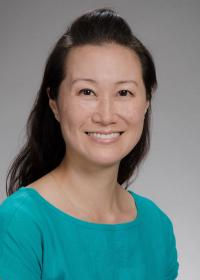
Faculty Spotlight: Dr. Christine Chung
Dr. Chung joined the Department of Medicine in 2020 as an interventional cardiologist in the Heart Institute at UW Medical Center. She finished her residency training at Brigham and Women’s Hospital in 2015 and over the following 5 years completed Cardiology, Interventional Cardiology and Structural Heart Disease fellowships at New York Presbyterian Hospital (Columbia Campus).
Beginning a new job and moving across the country is not easy, let alone doing it in the midst of a global pandemic.
“It was challenging to move with a young family to a new city in the midst of a global pandemic,” said Dr. Chung. “We rented our current home after a realtor did a brief walk-through using FaceTime. But my colleagues, as well as the staff in the Cath Lab here, have been so welcoming and have made the transition as smooth as it could have possibly been.”
Thanks to her supportive Interventional Cardiology colleagues, Chung was able to hit the ground running and begin to immediately focus on growing the left atrial appendage closure program at UWMC.
For patients with heart abnormalities, preventing and diagnosing blood clots in the left atrial appendage is important for preventing strokes. For many patients, a blood thinner may be recommended. For other patients, who are not good candidates for long-term oral medication, a more invasive procedure can be recommended, though can often be overlooked. That is where Chung and her team step in.
“I am passionate about growing the left atrial appendage closure program at UWMC. In just the past several months, I have seen many patients whose lives have been upended by various bleeding complications related to oral anticoagulation.”
“I believe that for the right subset of patients, undergoing a one-time procedure may be safer than the alternatives of either taking aspirin alone or nothing, with subsequent under-protection from stroke, or taking long-term anticoagulation, with risk of bleeding."
Comorbidities can increase a patient’s risk of serious cardiac events and can also play a role in their ability to tolerate oral anticoagulation medications. For many patients, understanding their social and environmental background is key to delivering the right plan of care, a lesson Chung learned early on in her career.
“One of the memorable moments in my career occurred when I was an intern taking care of a young patient with newly-diagnosed cardiomyopathy who was sick enough to require an inpatient evaluation for advanced heart failure therapies,” remembers Dr. Chung. “There was a component of alcohol and other substance abuse as well as a likely underlying hereditary cardiomyopathy responsible for his overall presentation.”
“I realized that physicians carry a heavy burden of making decisions that impact not only an individual patient’s life but also have societal ramifications.”
Delivering this level of specialized and holistic care for all patients is a goal better realized by improving Equity, Diversity and Inclusion within the medical system. Dr. Chung and colleagues in the Division of Cardiology are among several groups within the Department of Medicine working to formalize efforts to improve Equity, Diversity and Inclusion among staff and medical providers.
Among these efforts are regular forums to facilitate discussion and share readings and resources that build allyship and help address difficult topics, such as implicit bias.
“We also need to mentor trainees at every level in order to fill the pipeline and ultimately increase diversity amongst the faculty,” says Dr. Chung.
“Additionally, we plan to collect objective data on physician practice patterns with regards to patients’ racial/ethnic backgrounds, so we can think critically about how to reduce health disparities in our own patient panels before tackling things on a more systemic level.”
Dr. Chung’s passion for improving delivery of cardiac intervention and creating more diversity in medicine and patient care stem from a mindset focused on continuous improvement.
“My goal is to develop clinical expertise and experience within structural cardiology that will enable me to become a thought leader in this field. On a day to day basis, I strive to be meticulous and thoughtful in caring for each patient entrusted to me,” says Chung.
“I try to be critical of my procedural techniques and clinical decisions so I can keep growing and improving. I listen to those ahead of me in this process to learn as much as I can from their previous experiences.”
When she’s not at work, Dr. Chung enjoys time with her family and exploring her new surroundings in the Pacific Northwest.
“Any time I have outside of work is dedicated to my family, which is currently comprised of my husband and four-year-old daughter. We are eagerly anticipating the arrival of a sibling in April! My family and I enjoy hiking, camping and exploring the PNW. The timing of my pregnancy has precluded us from going skiing this winter but we look forward to hitting the slopes next year. I also love to cook and especially bake.”
In honor of American Heart Month, the Department of Medicine is proud to spotlight Dr. Chung’s work toward reducing morbidity and mortality associated with heart disease. In 2018, strokes accounted for about 1 of every 19 deaths in the US and cardiovascular disease continues to be the #1 cause of death in the US and worldwide.
Source: Heart Disease and Stroke Statistics – 2021 Update.
Dr. Christine Chung was also recently featured in the article Passion and Persistence: A Journey of Two Cardiologists featured on the UW Medicine Huddle website.